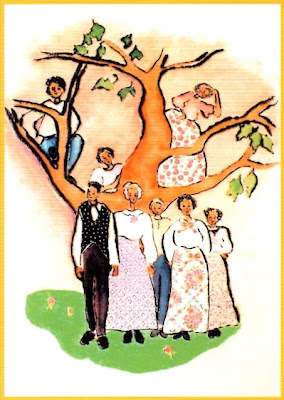 In celebration of October as Family History Month, the California Genealogical Society and the Oakland Regional Family History Center are combining resources and expertise to offer a four session Beginning Genealogy Course.
In celebration of October as Family History Month, the California Genealogical Society and the Oakland Regional Family History Center are combining resources and expertise to offer a four session Beginning Genealogy Course.
Each of the four classes will be offered twice – on Saturday, at the CGS Library, from 1:00 p.m. – 2:30 p.m. and on the following Tuesday, at the Family History Center, from 10:30 a.m. – 12:00 p.m. The same teachers and handouts will be used in both sessions and students can attend classes at either facility.
Classes are free but there will be a $10 charge for a notebook containing a syllabus of the four classes. Those students wishing to join the California Genealogical Society will also receive $10 off their memberships after attending all four classes. Free parking is available at both locations. The Oakland Regional Family History Center is located at 4766 Lincoln Avenue, Oakland, California.
Preregistration is necessary to ensure adequate handouts. Drop-ins will be welcome on a space available basis. Please register by telephone 510-531-3905 or E-mail fhc[email protected].
The class outline and schedule are as follows:
Part 1 – Introduction to the Science of Genealogy
In this introductory class, Marge Bell Assistant Director of the ORFHC, will teach students how to get started and cover basic genealogical terminology, forms, computer programs, and organization of research files.
Saturday, October 4, 2008, 1:00 p.m. – 2:30 p.m. at CGS
Tuesday, October 7, 2008, 10:30 a.m. to 12:00 p.m. at the FHC.
Part 2 – Secondary Survey
In the second class, Jane Lindsey President of CGS, will introduce students to the basic Internet research sites that feature compiled genealogies including, but not limited to, FamilySearch, Rootsweb, USGenweb. It will also include using digital library catalogs to help plan research and locate resources.
Saturday, October 11, 2008, 1:00 p.m. to 2:30 p.m. at CGS
Tuesday, October 14, 2008, 10:30 a.m. to 12:00 p.m. at the FHC.
There are no classes on Saturday, October 18 or on Tuesday, October 21.
Part 3 – Vital Records and the Calendar Change
This class, led by Marge Bell, will teach students how to locate birth, marriage, and death records at the various governmental levels, what one can expect to find on them and how the new information can lead to other clues and records. The class will also include the 1752 change in the calendar.
Saturday, October 25, 2008, 1:00 p.m. to 2:30 p.m. at CGS
Tuesday, October 28, 2008, 10:30 a.m. to 12:00 p.m. at the FHC
Part 4 – Censuses, Including the State Census
Richard Rees, CGS member and research consultant, will provide a short history of the U.S. census, explain how to use it and discuss ways to work around the common problems. As time permits, there will be an overview of state census records: what’s available and how to access the records.
Saturday, November 1, 2008: 1:00 p.m. to 2:30 p.m. at CGS
Tuesday, November 4, 10:30 a.m. to 12:00 p.m. at the FHC
Download the CGS Family History Month brochure for the full offering of October classes, workshops and consultations.
Illustration: “The Family Tree” by local artist Lyn White, from the cover of the Oakland Regional Family History Center brochure.


